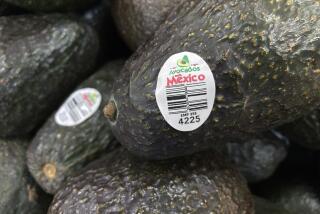Canada threatens trade sanctions over U.S. meat labeling law
Canada could slap trade tariffs on U.S meat, wine, cheese and other exports in response to a U.S. meat labeling law that the World Trade Organization recently declared unfair.
Canada’s international trade minister, Ed Fast, said Ottawa would consider retaliatory measures if Washington does not repeal the so-called country-of-origin labeling law, better known as COOL.
The controversial federal law was rolled out in 2013 and requires meatpackers and processors to list where livestock was born, raised and slaughtered.
Canada and Mexico denounced the law, saying it unfairly discriminates against their exports of beef and pork. A WTO panel ruled in their favor Monday, explaining that the law created less favorable treatment for Canadian and Mexican meat.
“The WTO has confirmed once again what we have known all along: that the United States’ mandatory COOL requirement for beef and pork is a blatant breach of its international obligations as a member of the WTO,” Fast said in a joint statement with Mexico’s secretary of the economy, Ildefonso Guajardo Villarreal, and secretary of agriculture, Enrique Martinez y Martinez.
The U.S. has 60 days to appeal the ruling. Though they said they were disappointed, U.S. trade officials noted that the WTO did not side with Canada and Mexico in asserting that the labeling failed to do its primary job: alert consumers about the origins of their meat.
“While the WTO continues to affirm the right of the United States to require country-of-origin labeling for meat products, we are disappointed that the compliance panels have found that the country-of-origin labeling requirements for beef and pork continue to discriminate against Canadian and Mexican livestock exports. We are considering all options, including appealing the panels’ reports,” said Matthew McAlvanah, a spokesman for the office of the U.S. trade representative.
Consumer groups urged Washington to appeal, arguing that COOL was a boon for food safety and transparency in the meat industry.
“The WTO’s continued assault against common-sense food labels is just another example of how corporate-controlled trade policy undermines the basic protections that U.S. consumers deserve,” said Wenonah Hauter, director of the Washington, D.C.-based Food and Water Watch. “The United States should appeal the ruling and continue to fight for sensible consumer safeguards at the supermarket.”
Canadian trade sanctions would be costly for U.S. producers. Ottawa released a list last year of potential American targets for tariffs that included dozens of items as far ranging as wooden furniture and ketchup.
Canada is the United States’ top trading partner. Mexico and China alternate between No. 2 and No. 3.
Follow @dhpierson for food and agriculture news.
More to Read
Inside the business of entertainment
The Wide Shot brings you news, analysis and insights on everything from streaming wars to production — and what it all means for the future.
You may occasionally receive promotional content from the Los Angeles Times.











